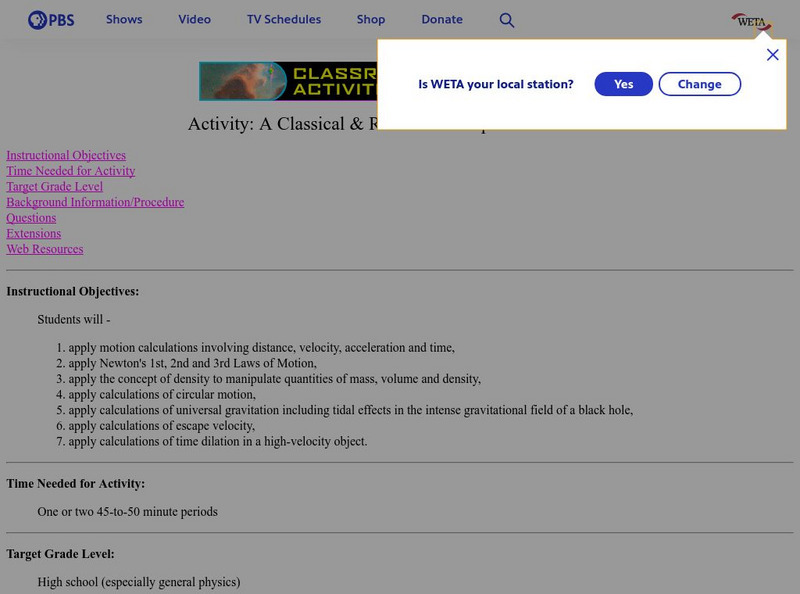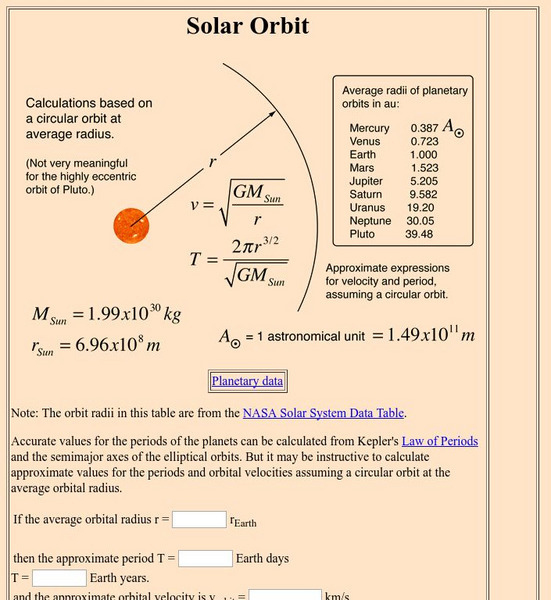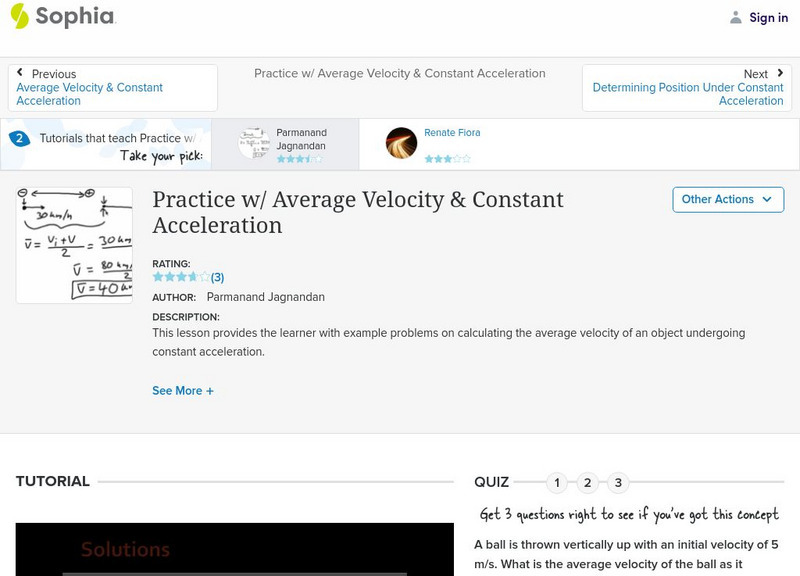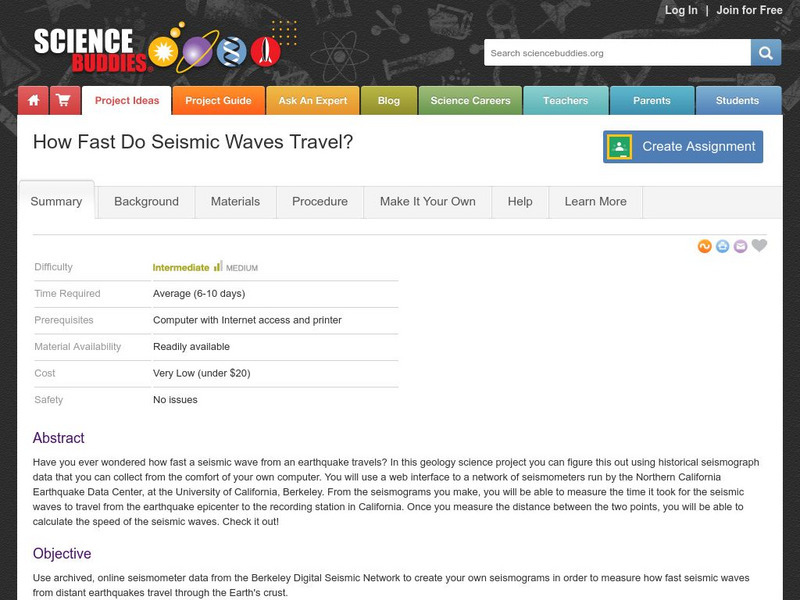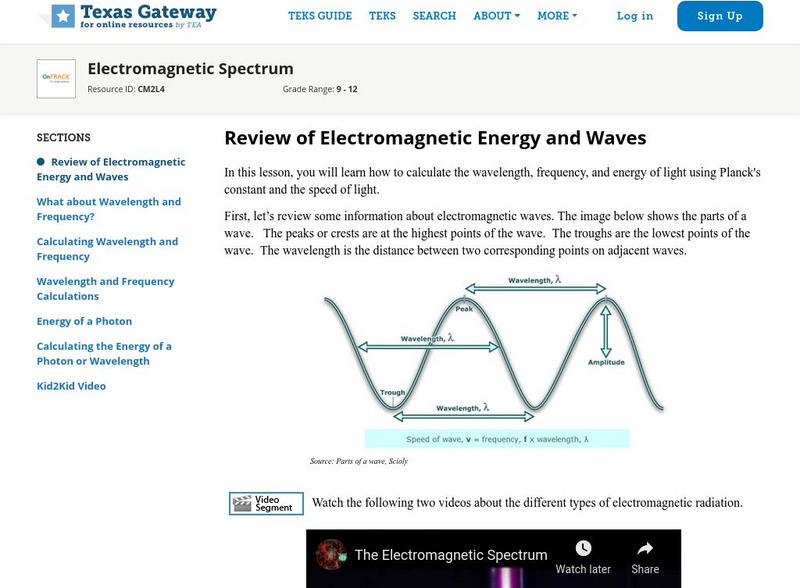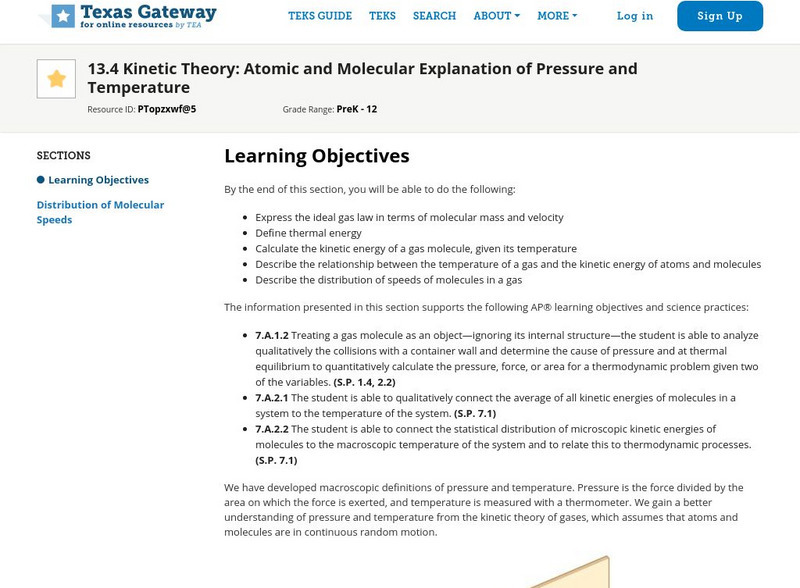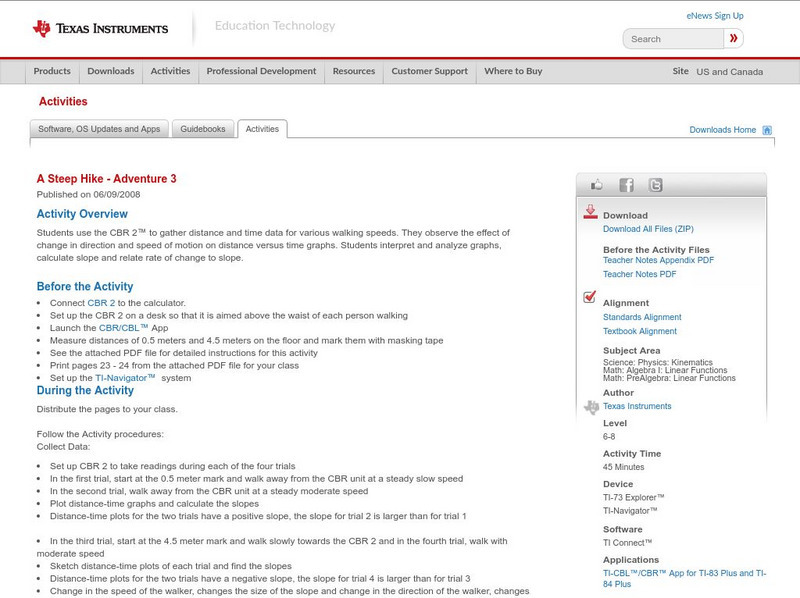Hi, what do you want to do?
Physics Aviary
Physics Aviary: Practice Problems: Motion on Incline Level 1
Students must calculate the distance an object will move up an incline using Newton's Laws. Mass, angle, gravitational field and initial speed will be generated randomly.
Physics Aviary
Physics Aviary: Practice Problems: Soccer Shot Simple
Students must calculate the maximum distance they can be from an soccer net and still hit a randomly generated target. The speed and angle of the kick will be generated randomly.
PBS
Pbs: A Classical and Relativistic Trip to a Black Hole
This PBS site is a classroom activity that takes a trip to a black hole. Students apply calculations on distance, velocity, acceleration, time, circular motion, density, and more.
Khan Academy
Khan Academy: What Is Centripetal Acceleration?
Learn what centripetal acceleration means and how to calculate it. Included are two example problems with solutions.
My Science Site
Bj's Science: Take a Walk! [Pdf]
In this activity students literally walk through this activity calculating acceleration. Also, students calculate speed, graph acceleration, as well as do statistical data analysis. This resource is in PDF form; requires Adobe Reader.
Georgia State University
Georgia State University: Hyper Physics: Solar Orbit
A table listing the average radius of orbit for the nine planets about the sun; expressed in astronomical units. Data can be used to calculate the orbital speed or the orbital period.
PBS
Pbs Teachers: Scientific American: Calls of the Wild: Bats and Echolocation
Explore bats' navigation systems by experimenting with echolocation. Approximate an object's distance by analyzing reflected sound waves, measuring the delay in sound and calculating the ratio to the speed of sound.
PBS
Pbs Teachers: Math Space Odyssey: How Long Is a Light Year?
This instructional activity helps pupils to demonstrate the ability to use a light year as a standard of measurement to calculate time and distance from the earth. They will also solve problems based on light years.
Sophia Learning
Sophia: Practice W/ Average Velocity & Constant Acceleration: Lesson 1
This lesson provides the learner with example problems on calculating the average velocity of an object undergoing constant acceleration. It is 1 of 2 in the series titled "Practice w/ Average Velocity & Constant Acceleration."
OpenStax
Open Stax: College Physics: Flow Rate and Its Relation to Velocity
In this section of the textbook learn how to define and calculate flow rate. Also learn the differences and similarities between flow rate and fluid velocity. Section also relates flow rate to processes in the body like calculating flow...
Texas Education Agency
Texas Gateway: Physics of Hearing: Ultrasound
By the end of this section, you will be able to define acoustic impedance and intensity reflection coefficient, describe medical and other uses of ultrasound technology, calculate acoustic impedance using density values and the speed of...
Science Buddies
Science Buddies: How Fast Do Seismic Waves Travel?
Here's a geology project that uses historical seismograph data that you can collect from the comfort of your own computer. You'll use a web interface to a network of seismometers run by the Northern California Earthquake Data Center, at...
Texas Education Agency
Texas Gateway: Electromagnetic Spectrum
This tutorial explores using Planck's constant and the speed of light to calculate the wavelength, frequency, and energy of light.
TeachEngineering
Teach Engineering: Projectile Motion
Students are introduced to the concept of projectile motion, of which they are often familiar from life experiences,such as playing sports such as basketball or baseball, even though they may not understand the physics involved. Students...
Texas Education Agency
Texas Gateway: Motion of an Object in a Viscous Fluid
By the end of this section, you will be able to calculate the Reynolds number for an object moving through a fluid, explain whether the Reynolds number indicates laminar or turbulent flow, and describe the conditions under which an...
Texas Education Agency
Texas Gateway: Kinetic Theory: Atomic & Molecular Explanation of Pressure & Temp
By the end of this section, you will be able to express the ideal gas law in terms of molecular mass and velocity; define thermal energy; calculate the kinetic energy of a gas molecule, given its temperature; describe the relationship...
Texas Education Agency
Texas Gateway: Physics of Hearing: Doppler Effect and Sonic Booms
By the end of this section, you will be able to define Doppler effect, Doppler shift, and sonic boom; calculate the frequency of a sound heard by someone observing Doppler shift; and describe the sounds produced by objects moving faster...
PBS
Pbs Teachers: Supersonic Dream
Examine how fuel use affects the mass of different planes during flight. This lesson teaches young scholars how to determine the per person fuel cost of a transatlantic flight for seven airplanes, and display the results on a bar graph....
Texas Education Agency
Texas Gateway: Atomic and Molecular Explanation of Pressure and Temperature
We gain a better understanding of pressure and temperature from the kinetic theory of gases, which assumes that atoms and molecules are in continuous random motion. Learn more about Kinetic Theory with the following detailed resource...
Other
Sprk: Macro Lab Lesson 4 Percentages: Teacher Guide [Pdf]
Students will use Sphero to explore percentages using speed and color. The speed experiments are quantitative and the color experiments are qualitative. They will program the Sphero to move at 100% speed for a particular amount of time,...
Other
Sprk: Macro Lab Lesson 3 Mean, Median, & Mode: Teacher Guide [Pdf]
Learners will use Sphero to conduct an experiment. They will identify how long they need Sphero to move at 10% speed to reach and knock over a target object (such as a whiteboard marker). Using this information, they will then calculate...
Texas Instruments
Texas Instruments: A Steep Hike Adventure 3
Students use the CBR 2 to gather distance and time data for various walking speeds. They observe the effect of change in direction and speed of motion on distance versus time graphs. Students interpret and analyze graphs, calculate slope...
Science Struck
Science Struck: Kinetic Energy Formula
Explains what is meant by kinetic energy and demonstrates how to use the formulas for a point mass moving at less than the speed of light, for rotational motion, and for a mass moving at a relativistic speed. Includes interactive...
Physics Aviary
Physics Aviary: Circular Acceleration
This program gives students a visual representation of why an object moving in a circle at constant speed is accelerating. This program will guide students through a method of calculating the circular acceleration based on the change in...
Other popular searches
- Calculating Speed Distance
- Calculating Speed Lab
- Calculating Speed Problems
- Calculating Speed of Light
- Calculating Speed Toy Cars
- Physics Calculating Speed
- Calculating Speed of Stars
- Calculating Speed Tickertape
- Calculating Speed Worksheets
- Calculating Speed Ticker Tape
- Calculating Speed of Sound
- Calculating Speed Stars






